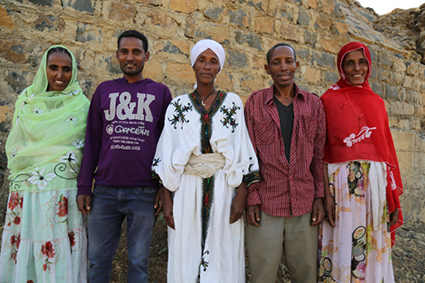7.4.2 Programme Management Units and WASH teams
Programme Management Units (PMUs) are responsible for implementing OWNP plans and activities at federal and regional level, and zonally where appropriate. They have been established within an appropriate department of the three main implementing ministries. (There is no need for a PMU at MoFED because they do not undertake active WASH projects.) Their staff may be permanent employees, contract staff or consultants. The size and composition of each of the units will vary from ministry to ministry, depending on the magnitude and nature of the particular ministry’s activities related to WASH.
Federal level
At federal level, the PMUs in each ministry will ensure their respective regional PMUs, woreda and town sector offices have the directions, information, systems, skills and resources necessary to carry out their WASH mandate and achieve expected programme results. For example, the PMU would provide training for staff, review plans and designs, support M&E and so on.
Regional level
At regional level there is a similar structure. Each of the three bureaus (water, health, and education) have PMUs within an appropriate department. The size, structure and composition of each of the units will vary from bureau to bureau depending on the nature of the particular bureau’s input to the OWNP. A Unit Head will be appointed whose duties will include serving as the focal person for their bureau in the Regional WASH Coordination Office (see Section 7.5).
The regional PMU role and responsibilities are similar to the national level but at the next step down in the hierarchy. They ensure that the WASH teams have what they need to carry out their WASH activities. They tend to be responsible for larger projects, such as the construction of water supply schemes.
Woreda/Town WASH Team
Woreda WASH Teams or Town WASH Teams are responsible for implementing planned activities under the direct supervision of their woreda or town WASH Steering Committee. Membership includes the heads or representatives of the water, health, education and finance offices, and other permanent or contract staff with a variety of roles. These include coordinators, accountants/clerks, environmental health workers, development agents, WASH consultants, community facilitators, and contractors and suppliers.
The Woreda WASH Team (WWT) coordinates the input of the various sector offices, supports the daily management of the activities and is accountable for achieving expected results (POM, 2014). They are responsible for such activities as the construction of small-scale water schemes for communities, schools and health facilities, giving training on CLTSH (community-led total sanitation and hygiene) and other relevant topics for communities, HEWs, the HDA and others.
Community WASH committee
In rural areas, the community WASH Committee or WASHCO plays an important role in OWNP implementation by managing the operation and maintenance of specific water schemes. WASHCOs are established for one community in order to manage one specific WASH facility. They are accountable to the WWT. In one kebele there may be many WASHCOs depending on the number of WASH facilities. They have between five and six members, at least 50% of whom must be women. Case Study 7.1 describes one WASHCO in Amhara region.
Case Study 7.1 WASHCO at Alem Sefer
Alem Sefer village is near Meksignit, a rural kebele in Fogera district, Amhara Region. The village has a new water point that has been in use since December 2014. It provides safe water close to a community of 270 people.
Figure 7.5 shows the WASHCO of three women and two men who have been elected from the community to manage their water point.

This community WASHCO is led by women. They have been chosen to lead because they understand that collecting water is predominately women’s responsibility: ‘It is us who are well aware of the challenges the lack of access to safe water brings to us and to our family,’ says Nurit Kalilu, the treasurer.
Hawa Wadajine, on the right in the photo, is the chairperson of this committee. She carries the overall responsibility of managing the water point. Nurit Kalilu, on the left, oversees the income which is generated from the collection of the monthly water tariff. This is 5 Birr/household, which is expected to bring in about 160 euros a year. The community has also deposited 60 euro as an up-front cash contribution to a bank account in the local micro-finance institution. This can later be used for the operation and maintenance of the water point.
7.4.1 Implementation in the main WASH ministries
